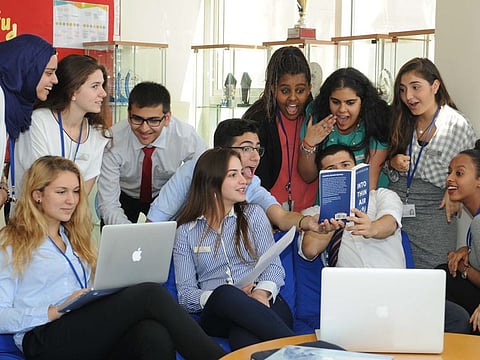New Dubai schools boost total enrolment to record high
Four new private schools offering 7,000 seats take total student roll well past 300,000

Dubai: The school sector in Dubai continues to record steady growth, with four new private schools opening in this academic year. In April, enrolment in Dubai’s private schools had crossed 300,000, the highest ever in its history.
The new schools will offer 7,000 additional places across three curricula: British, American, and International Baccalaureate (IB). Private school students in Dubai represent 187 nationalities. Dubai also hosts 10 branches of prestigious international schools, such as the newly-opened Royal Grammar School Guildford and Durham School.

Last year, the Chinese School Dubai became the first ever institution to offer the Chinese national curriculum for K-12 education outside the country. The school’s new campus located in the heart of Mirdif brings the teaching model of China’s highly rated Hangzhou No. 2 High School to Dubai.
In just the past three years, 21 new private schools opened in Dubai, taking the total number of schools in the sector to 215 and international curriculum choices to 18.
UK curriculum schools are the top choice (35 per cent) followed by Indian curriculum (26 per cent), US curriculum schools (16 per cent) and IB (six per cent).
Education ecosystem
Officials said investors and educators around the world are looking at Dubai as a promising location for implementing high-quality educational models that integrate national curricula with a global outlook. The Chinese School in Dubai, for example, seeks to foster high-level learning and innovation among students while helping them develop an international vision. In addition to the Chinese curriculum, the school offers students Arabic as second language, Islamic studies, moral education and local studies based on the UAE’s national curriculum. Although it has mainly focused on serving the Chinese community in the emirate, the not-for-profit school is also opening its doors to students from other nationalities.
In another recent school launch that validates the city’s investment appeal in the education sector, Britain’s prestigious 500-year-old Royal Grammar School Guildford opened in the city. The school is ranked as one of the top schools in the UK at both A Level and GCSE. In its first academic year in 2021-22, Royal Grammar School Guildford, located in the Tilal Al Ghaf development, had already enrolled 250 students.
One of Britain’s oldest schools, Durham School, a celebrated institution with a 600-year history of academic excellence, is also the latest among a host of new elite international learning institutions that have chosen Dubai to establish an overseas branch. Founded in 1414 and refounded in 1541 by King Henry VIII, the highly respected school has only two other international branches elsewhere in the world. Located in Dubai Investments Park, the school has a capacity to cater to 1,700 pupils.
Dubai also recently saw the establishment of its first-ever Australian curriculum school. Located in Al Barsha South, the Australian International School opened its Dubai campus at the start of the 2021-22 academic year. With a capacity to serve 2,000 students, the school offers a future-focused curriculum to help students develop a deeper understanding about the world around them and their place in it. The multi-facility school offers multiple pathways for graduating students, including a Queensland Certificate of Education or IB Diploma.
Long-established institutions
Dubai is home to a wide range of schools established for specific communities. The Japanese School is an example of an institution that offers a traditional curriculum and a unique Japanese cultural experience in Dubai. Established in 1980, the Japanese School seeks to enable students to adapt to the Japanese education system once they return to Japan. Currently catering to around 146 students, the school, situated in Al Wasl, provides private education for boys and girls from Primary to Junior High, aged six to 15 years. Following the prescribed Japanese Ministry of Education curriculum, the school’s goal is to provide an enriched learning environment for its students.
Another long-standing institution is the German School Dubai (Deutsche Internationale Schule Dubai - DISD), which was established in 2008 in response to the demand from the emirate’s sizeable German community. Currently catering to a total of 820 students, the majority of whom are native German speakers, the private K-12 school, located in Academic City, offers the curriculum of the German Federal State of Thüringen with certain subjects taught in Arabic and English. The school has fully adopted new technologies, including augmented reality and coding while also paying attention to the wellbeing of the school community.
The Russian International School located in Muhaisnah is yet another long-established school. First set up in 1996, the school teaches the Russian curriculum to 174 students, the majority of whom are Russian nationals. It is the only school in the UAE where Russian educational programmes are taught and the federal policy of general education in the Russian Federation is implemented. Offering an education from the equivalent of KG1 to Grade 11, the school offers a curriculum leading to the Volograd leaving examinations. Over the last 25 years, RIS’ graduates have successfully pursued higher education qualifications at universities in Russia, the UAE, USA, the Netherlands, and Asia. While the curriculum is taught in Russian, the school also teaches its students Arabic and English.



![Social media claims of cancellations dismissed; official updates to be shared through authorised channels. [Illustrative image]](http://media.assettype.com/gulfnews%2F2025-11-15%2Fx2mp12df%2Fexam.jpg?w=320&auto=format%2Ccompress&fit=max)